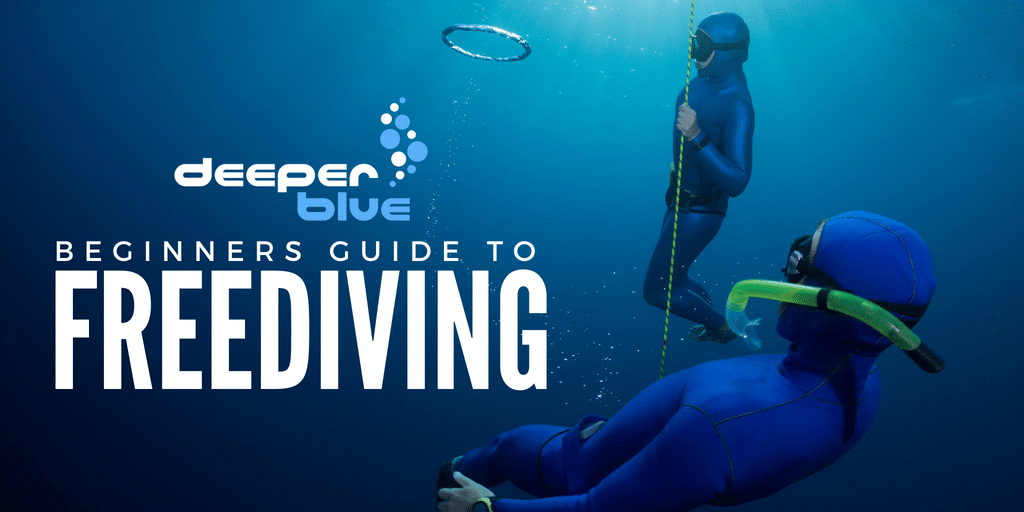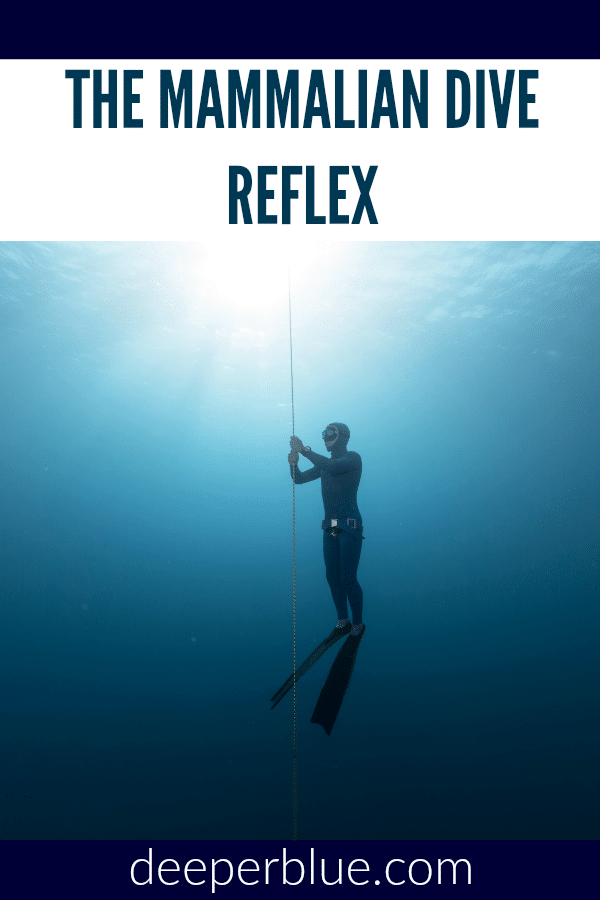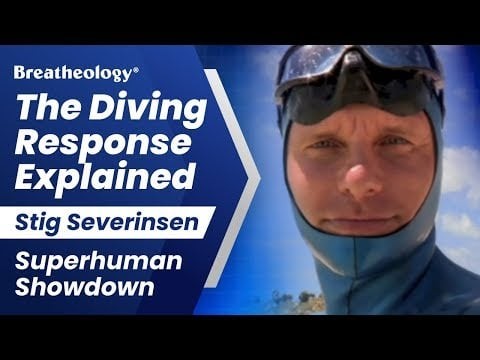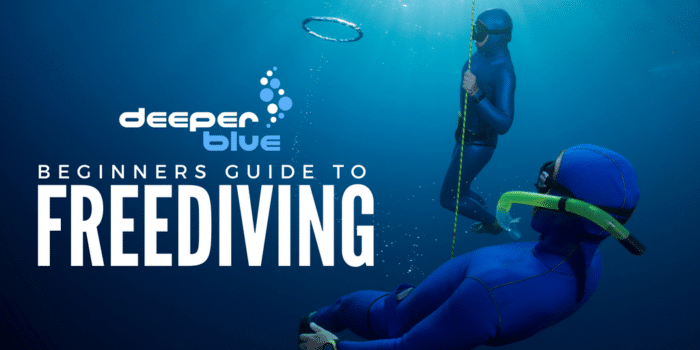This article is part 9 of 21 in the Beginners Guide to Freediving
In this article, we’ll be looking at the mysterious mammalian dive reflex and how this helps us dive deeper for longer.
What Is The Mammalian Dive Reflex?
The mammalian dive reflex, or MDR, is a reflex hard-wired into our genetic makeup and is brought on by immersion in water (particularly the face) and holding your breath.
It is seen in all kinds of mammals and is very strong in children. In the middle part of the twentieth century, when people started setting freediving records for the first time, the mammalian dive reflex in humans had not been recognized and it was believed that a dive to 30m would crush the lungs. Experiments on freedivers, particularly with Jacques Mayol and Bob Croft, demonstrated the extraordinary effects of the mammalian dive reflex, and research is still being performed today to further investigate the incredible adaptations of the human body to breath-holding.
The main characteristics of the mammalian dive reflex are bradycardia, peripheral vasoconstriction, blood shift, the spleen effect, and immersion diuresis, and we’re going to look at each in turn to see the benefits and some drawbacks for freedivers.
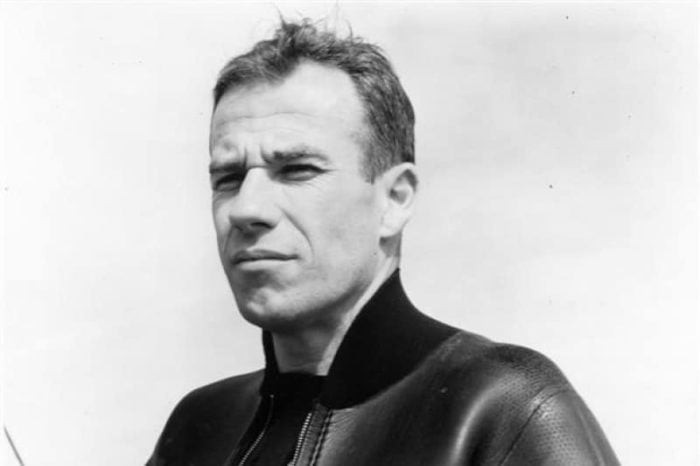
Bradycardia
This is translated as ‘heart slowing’ and refers to the fact that when we hold our breath, our heart rate decreases, all the better to conserve oxygen. Jacques Mayol’s heart rate slowed to 27 beats per minute when he dived to 101m and a study in 1985 of cold water facial immersion showed that five people out of 27 experienced bradycardia of less than 15 bpm – one individual’s heart rate dropped to an incredible 5.6 bpm. The same study discovered that the effects of bradycardia are enhanced as the temperature of the water in which the subject is immersed decreases.
The effect of bradycardia on breath-holding can be seen even when a person is nowhere near water. If you strap on a heart rate monitor and do an apnea ‘dry walk’, you will see your heart rate rapidly drop, even though you’re physically active. I have advanced students perform this to see how pronounced their dive reflex is. They sit on a chair breathing gently, then take a last full breath in, hold their breath seated for 30 seconds, and then stand up and walk (still breath-holding). Responses vary by individual, but all experience a drop in heart rate whilst walking, some to less than half their resting heart rate.
Freedivers can even train to increase the effects of bradycardia, such as beginning a static session with a period of facial immersion while breathing through a snorkel, while others train by doing breath holds in bowls of ice water, varying the temperature to see different results.
Peripheral Vasoconstriction and Blood Shift
Peripheral vasoconstriction and blood shift are linked. Peripheral vasoconstriction is where the blood vessels in the extremities (your hands, feet, arms, and legs) begin to constrict, shifting more blood to the core of the body. By moving blood from areas where the body needs it least, the vital organs are prioritized. This can be observed out of the water, too. One of my students relaxed in a seated position and performed minute-long breath holds repeatedly, with only one breath in between the breath holds. After a few minutes, his hands and feet went white and this started spreading up his arms and legs.
Blood shift, meanwhile, explains why freedivers can exceed the residual volume of their lungs when diving, all without their lungs collapsing, and what happens to some of the blood from peripheral vasoconstriction. As the lungs compress, the blood vessels around the alveoli expand with blood to compensate for the reduced volume of the lungs. Blood shift goes hand in hand with diaphragm and rib cage flexibility because without those two ameliorating factors lung barotrauma can occur, when blood can actually enter the lung cavities.
The Spleen Effect
The spleen effect is another way your body can maximize oxygen efficiency. After repeated freediving, the spleen contracts, releasing more red blood cells into the blood. This increases the oxygen-carrying capacity of the blood, enabling longer dives or breath holds. There is inconclusive evidence of when this occurs in the dive session, but at least one dive or breath-hold has to have taken place before the spleen effect occurs. It is thought that the effects are only temporary, however anecdotal evidence has shown that active and deep freedivers have managed to sustain a higher than normal hematocrit level (the amount of hemoglobin in the blood) for many days after their last dive.
Immersion Diuresis (aka “the need to pee”)
One side effect of the mammalian dive reflex is immersion diuresis, whereby the freediver’s body increases urine production. This is brought on by pressure caused by full-body immersion in water, peripheral vasoconstriction, and a reduction in body temperature.
Water draws heat away from the body, leading to vasoconstriction of the blood vessels in order to conserve heat. The mammalian dive reflex also causes peripheral vasoconstriction which has the same effect. In response to the resultant increase in blood pressure, the body inhibits the release of the anti-diuretic hormone ADH, also known as vasopressin, causing increased urination.
Increased water pressure on the body also increases blood pressure, no matter the water temperature, again increasing urination. All of which means it’s incredibly easy for freedivers to rapidly become dehydrated. Consequently, it is important to keep your fluid levels up during a long dive session. A headache and bad breath are both indicators of dehydration.

Muscle Fatigue
Another side effect of the mammalian dive reflex is the buildup of lactic acid in the muscles. As blood moves away from the limbs, the muscles rely more heavily on anaerobic respiration, which produces lactic acid. This causes a feeling of heaviness, or lactic acid ‘burn’ in the muscles and, in extreme cases, the muscles can simply stop functioning.
The mammalian dive reflex is a fascinating series of adaptations that the body has developed to aid breath-holding and immersion in water. It enables the freedivers to better handle pressure and depth, enhances the blood’s oxygen-carrying capacity, and enables the more efficient use of that oxygen in the body. In order to fully benefit from these advantages, however, freedivers need to be aware – and plan to prevent – the associated disadvantages. Keeping hydrated is vital and the better your physical fitness, the faster your body will recover from the buildup of lactic acid.
Click here for more articles in the Beginners Guide to Freediving

